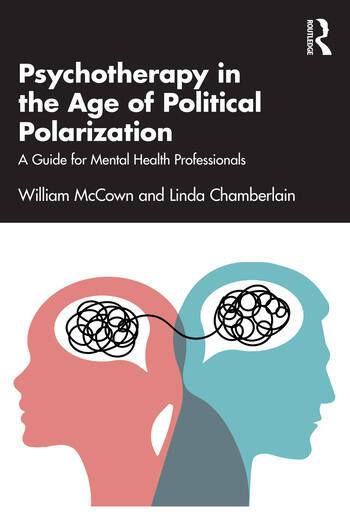Psychotherapy in the Age of Political Polarization: A Guide for Mental Health Professionals

Book Details
- Publisher : Routledge
- Published : 2025
- Cover : Paperback
- Pages : 228
- Category :
Forthcoming - Category 2 :
Psychotherapy and Politics - Catalogue No : 98027
- ISBN 13 : 9781032651125
- ISBN 10 : 1032651121
Reviews and Endorsements
Psychotherapy in the Age of Political Polarization: A Guide for Mental Health Professionals is a timely must-read for mental health students and professionals seeking to better understand the contemporary political and social influences on the lives of our clients.
Zander Keig, NASW, Social Worker of the Year (2020)
This book addresses a serious issue in the mental health field. Conservatives have a difficult time finding a therapist they can trust. In other contexts, therapists have come to understand that they must be knowledgeable and sensitive to the beliefs and values of their clients. It is time to recognize this is also true of political orientation.
Paul Norris, LMFT, associate director Braver Angels debate program
Politics, and the political strife that characterizes contemporary American society, inform clients’ sense of identity, belongingness, and psychological safety. Our clients inevitably bring political issues to the consulting room, not merely as opinions, but as crucibles for defining their world-view and their sense of place and purpose in society. The inherent tension between the fundamental human need for interpersonal connection, versus the rampant and worsening alienation and fragmentation in the body politic, endangers well-being at all levels — family, neighborhood, community, workplace. Drs. McCown and Chamberlain courageously take on a delicate task: bringing solid research perspectives to bear to illuminate an ethically sensitive and clinically meaningful approach to these issues, with the therapeutic mission and the well-being of the client always in the foreground. This is timely and valuable work, especially but not only for early career clinicians and those in training.
Jonathan Richard, Ph.D., clinical psychologist
William McCown and Linda Chamberlain brilliantly elucidate how the emotional and psychological impact of deep political divisions may become reflected within the therapy relationship. Demonstrating how political views are deeply rooted in people's identities and values, they further illustrate how disagreements can fracture the therapeutic alliance, create a breach of trust, or lead to irreparable treatment ruptures. McCown and Chamberlain enrich our understanding of the political divide by offering information and skills that mental health professionals can incorporate into their practices, including the importance of empathy, non-judgment, communication skills, and fostering a deeper understanding of shared human experiences. The effects of extreme partisanship and its impact on treatment and relationships are certainly not taught to mental health professionals who inevitably encounter this phenomenon in their practices. Skillfully, sensitively, and intentionally, McCown and Chamberlain guide clinicians to approach rather than avoid or fear issues of political partisanship in their work. Psychotherapy in the Age of Political Polarization is a great learning source for any mental health clinician.
Mary Lamia, Ph.D, clincial psychologist, psychoanalsyt, professor, author
The authors stress a fundamental truth: Human beings are more alike than they are unalike, and thus, all have the foundational need to be emotionally healthy. These authors know the “social territory” and how to navigate the present terrain. They offer down-to-earth practical strategies on how to just that. The case studies help readers to visualize the effectiveness of these strategies and further demonstrate the authors’ collective expertise. A job well done!
Pamela Higgins Saulsberry, Ph.D, LCSW-BACS, professor Emeritus of social work, University of Louisiana at Monroe
Therapists can no longer afford to ignore the sequelae between race, gender, and politics particularly among those existing on the margins of American society (i.e., Blacks, Asians, women, children, LGBTQIA). Political polarization continues to negatively impact these groups at disproportionate rates on a local, state, and national scale. This book allows the reader(s) to engage in critical discourse about how these factors can inform their therapeutic practice and patient-counselor interactions. Each chapter offers the reader(s) how political polarization affects individuals, groups, and families across all human systems (e.g., micro, macro, and mezzo). I strongly recommend this book for practitioners concerned with learning practical ways and theoretical-based ways of achieving authentic communities with marginalized communities.
Raymond Adams, Ph.D, MSW, MPH, associate professor, Morgan State University School of Social Work, editor-in-chief of Social Work in Public Health

